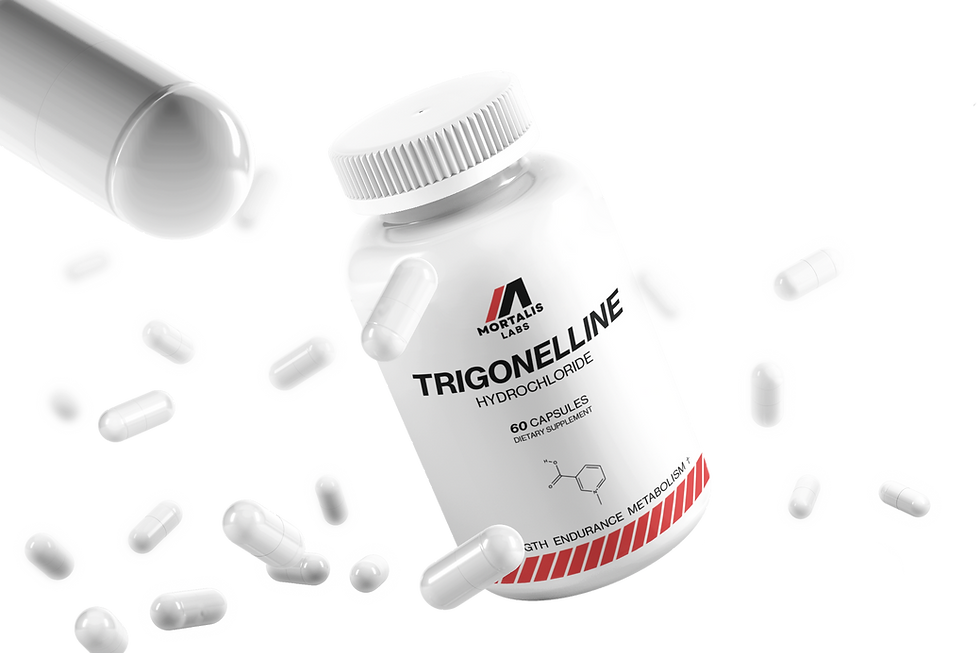Trigonelline shows therapeutic potential for diabetes and central nervous system disease
- ethan6161
- Aug 30, 2024
- 2 min read
Updated: Apr 8, 2025
Alzheimer's disease is a debilitating neurodegenerative disorder that affects millions worldwide. Recent research from NIH has identified various potential therapeutic targets and strategies, including the use of trigonelline, a bioactive compounds found in plants. Trigonelline has shown promise in preclinical studies as a potential treatment for Alzheimer's and diabetes.
What is Trigonelline?
Trigonelline is an alkaloid compound present in various plants such as coffee and fenugreek. Recent studies have also highlighted trigonelline's potential benefits in treating diabetes and other metabolic disorders, and it's benefit as a precursor to NAD+. Visit Mortalis Labs to buy a high-purity Trigonelline Supplement.
The Potential of Trigonelline for Alzheimer's Treatment
Researchers from NIH have investigated the effects of trigonelline on cognitive function, oxidative stress, and inflammation in a mouse model of Alzheimer's. The study aimed to explore the potential therapeutic benefits of trigonelline in treating this complex neurodegenerative disorder.
Neuroprotective Effects of Trigonelline
Trigonelline treatment significantly reduced amyloid-beta (Aβ) levels and improved cognitive function in mice with Alzheimer's-like symptoms.
The compound also exhibited antioxidant activity, scavenging reactive oxygen species (ROS) and reducing oxidative stress in the brain.
Inhibition of Amyloid-beta Formation
Trigonelline inhibited the formation of Aβ peptides by reducing the activity of beta-secretase, a key enzyme involved in amyloid-beta production.
The compound also modulated the activity of other enzymes and signaling pathways related to Alzheimer's disease pathology.
Antioxidant and Anti-inflammatory Effects
Trigonelline exhibited potent antioxidant activity, reducing ROS levels and minimizing oxidative damage to brain cells.
Inflammation was significantly decreased after trigonelline treatment, with downregulation of pro-inflammatory cytokines and upregulation of anti-inflammatory cytokines.
Trigonelline: A Potential Therapeutic Agent for Diabetes
trigonelline was found to have a positive effect on glucose metabolism and insulin sensitivity in diabetic mice. The compound's ability to enhance pancreatic beta-cell function, improve glucose uptake in muscle cells, and inhibit advanced glycosylation end-product (AGE) formation suggests that it may be a useful adjunctive therapy for diabetes management. Further research is warranted to fully explore the potential benefits of trigonelline in the treatment of this complex metabolic disorder.
Improved glucose metabolism: Trigonelline was shown to enhance glucose uptake in muscle cells, suggesting its potential to improve insulin sensitivity and glucose regulation.
Pancreatic beta-cell protection: The compound was found to protect pancreatic beta-cells from oxidative stress and apoptosis, which can contribute to the development of diabetes.
Inhibition of advanced glycosylation end-product (AGE) formation: Trigonelline inhibited the formation of AGEs, which are harmful compounds that can accumulate in diabetic patients and contribute to the progression of diabetes complications.
Conclusion
The study's findings suggest that trigonelline may possess therapeutic potential for treating Alzheimer's disease and may benefit diabetes. Its neuroprotective effects, inhibition of amyloid-beta formation, and antioxidant and anti-inflammatory properties make it a promising candidate for further investigation as a treatment for this devastating condition.
Future Directions
Investigate the efficacy and safety of trigonelline in combination with existing Alzheimer's treatments.
Elucidate the specific molecular targets and pathways involved in trigonelline's therapeutic actions.
Conduct human clinical trials to explore the potential benefits of trigonelline in treating Alzheimer's disease.


